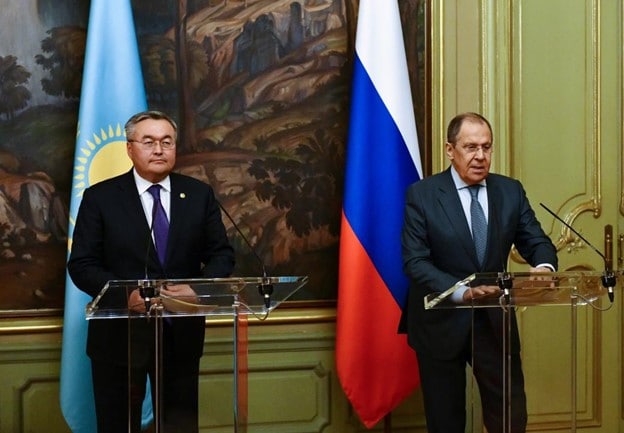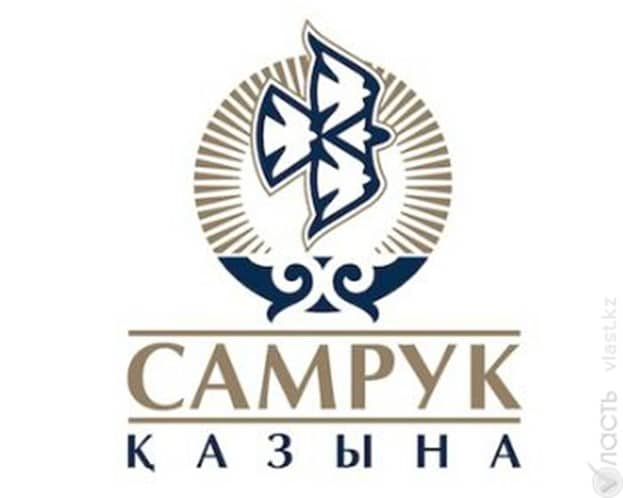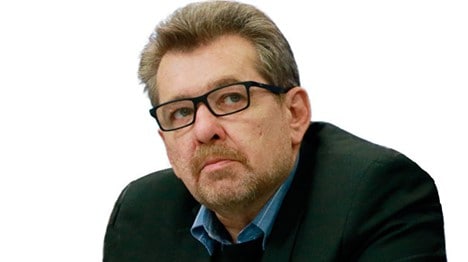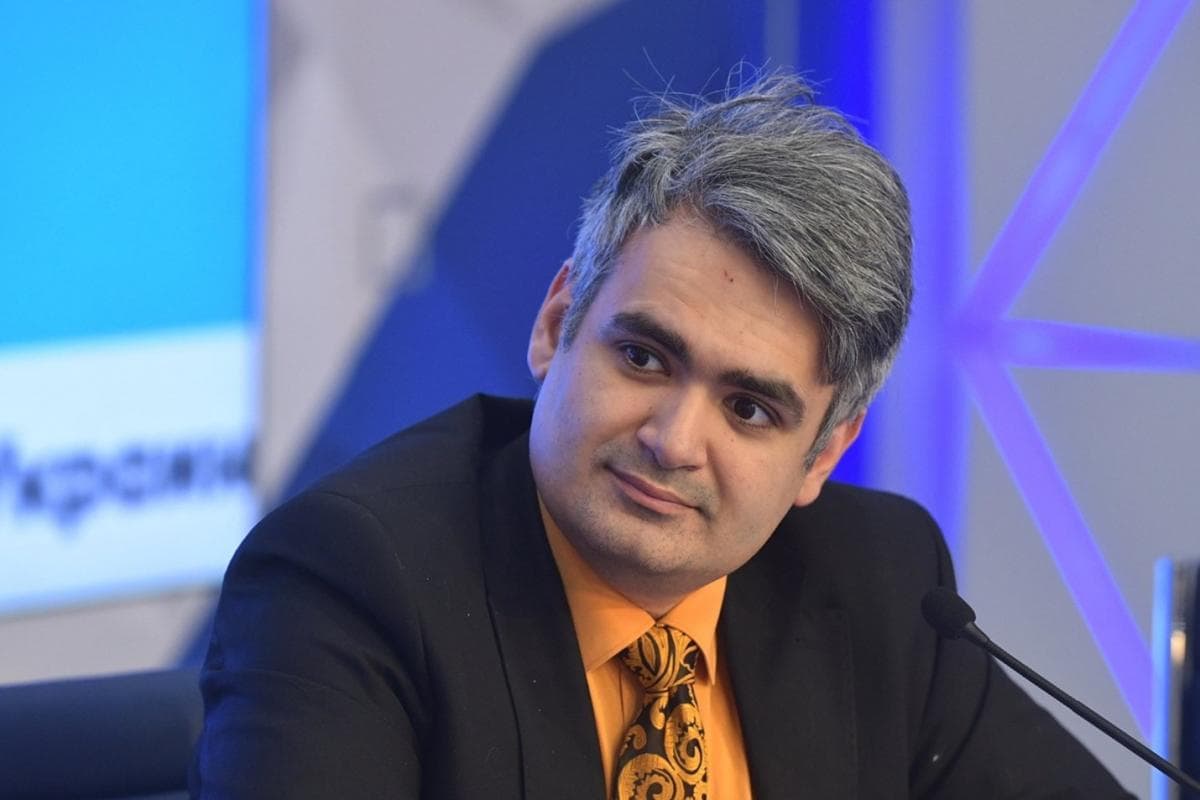Russia's "special operation" in Ukraine has aroused tensions in Moscow's relations with former Central Asian Soviet Republics that attained their independence upon the USSR's collapse. They are being pressured by the West to adhere to the sanctions regime against Russia, while Russia expects them to conduct commerce as usual and perhaps even to provide assistance in circumventing the sanctions. Some in the republics express fears that what happened to Ukraine could happen to them as well, and that Russia could claim the right to protect the ethnic Russian minority as it did in Ukraine.Kazakhstan exemplifies this phenomenon. On April 22, 2022, Kazakhstan's Foreign Minister Mukhtar Tleuberdi visited Moscow and held talks with his Russian counterpart Sergey Lavrov. The talks concluded on a positive note as the two sides affirmed: " Foreign policy coordination between Russia and Kazakhstan remains a valuable tool for realizing the interests of the two countries in the international arena - in strict accordance with the Treaty between the Russian Federation and the Republic of Kazakhstan on good neighborliness and alliance in the 21st century, signed by the heads of state in Yekaterinburg in 2013."[1] Despite the upbeat conclusion to the talks leading up to the visit was a spate of alarmist commentary in the Russian press about Kazakhstan's recent conduct. Kazakhstan was accused of siding with the West over Ukraine and shutting down pro-Russian demonstrations within its territory. For Russia this represented gross ingratitude, considering the fact that it was timely Russian-led intervention that presumably saved the current regime of Kassym-Jomart Tokayev from violent demonstrations launched by terrorists and Islamists.[2]
MEMRI's report on the tensions in relations between Russia and Kazakhstan follows below:

Mukhtar Tleuberdi with Sergey Lavrov (Source: Informburo.kz)
The day of his arrival in Moscow, Mukhtar Tleuberdi could have seen the following interview in the widely-circulated Moskovskiy Komsmolets (MK), that was ominously titled "Kazakhstan Buckled Before the West, Betraying Russia" The interview went as follows:
"Kazakhstan's state-owned Sovereign Wealth Fund [hereafter - SWF] Samruk-Kazyna proclaimed that it won’t consider attracting finance in rubles any longer due to sanctions against Russian banks. This was made announced at a briefing by the Managing Director for Economics and Finance, a member of the SWF board, Nazira Nurbaeva. According to her, previously such funding was relevant, but now the situation has changed.
The Samruk-Kazyna fund, founded in 2008, is a commercial entity, in which the Kazakhstan government is the sole shareholder. Its "portfolio" includes such companies as: the “Air Astana” air carrier, the national oil and gas company “Kazmunaigas,” “Kazatomprom” and “Kazakhstan Railways.”
Andrei Grozin the head of the Central Asia and Kazakhstan department in the Commonwealth of Independent States Institute in an exclusive for MK comments on the announcement by the fund's representative.

Samruk-Kazyna logo (Source: Vlast.kz)
So, it turns out that Kazakhstan, whose statehood Russia saved back in January [2022], is still ready "to stab it in the back"?
There is heavy pressure by our Western no-longer partners on Kazakhstan. Under Secretary of State [for Civilian Security, Democracy, and Human Rights], Uzra Zeya visited there not long ago. She stated outright that she appreciates Kazakhstan's stance, that the US side takes Kazakhstan's interests into account in connection with the sanctions pressure on Russia. She claimed that joint work is being done, in order to reduce the expenses of anti-Russian sanctions for Kazakhstan.
Kazakhstani officials serving at the deputy-chief-of-staff level, [Timur] Suleimenov or his deputy have reiterated over the past month and a half that they are concerned that secondary sanctions could be extended to Kazakhstan, should it somehow attempt to convert its opportunity to supply Russia with sanctioned materials or conduct financial transactions with Russia’s banks.
The situation is fairly clear. The Kazakhs are afraid. They wanted to "sneak between the currents” [and avoid getting wet]. A month ago, Kazakhstan’s expert community had many different versions of how Kazakhstan could make a mint by transforming into such a "hub", as it was the case back in the day with the [fictitiously labeled] “Belarus-made” shrimp and mango. Now all these talks have fallen silent. There is huge pressure on them.
So, we won’t be sampling 'Kazakh-made' shrimps, and all our hopes that Kazakhstan will help us circumvent the sanctions are in vain?
The Kazakh elite got the message even before the sanctions, a few years ago, when a notable part of all Kazakh reserves was frozen in Western banks. Then the reserves were unfrozen, but this left a residue behind.
The Kazakh elite is afraid: for themselves personally, for their resources (which are all deposited in Europe and the US) and for the country’s budget. Apparently, the goal of the American’s visit [i.e. of Uzra Zeya] was to convey to the Kazakhs the idea that all this could happen again, literally at the snap of a finger.
Therefore, decisions are now being to demonstrate that Kazakhstan, while trying to remain true to a multi-directional policy, is pushing the Russian direction to the background and is buckling under to the Western agenda.
What can Russia do in this situation?
If Russia reacts to this policy in any other way than it has been done so far, then what Comrade Saakhov talked about [the girl he abducted] in "The Prisoner of the Caucasus" movie may happen, "In a day she will be hungry, in a week she will pine, and in a month, she will be smart.”
My point is that 90% of Kazakhstan's exports go through the Russia’s territory. Not to mention another issue, which can very easily bring the Kazakhstani elite to a more or less sober state of mind. Whether Russia takes these steps or will try again "to understand and forgive" our weak-willed strategic partner, this is a question for the Kremlin.[3]

Andrei Grozin (Source: Ukraina.ru)
However, Russia was not only miffed by Kazakhstan's compliance with the sanctions. Kazakhstan had also backed Ukraine on the territorial issue. Timur Suleimenov, First Deputy Head of the Presidential Administration said: "Of course, Russia would like us to be more on its side. But Kazakhstan respects the territorial integrity of Ukraine. We have not recognized and do not recognize either the situation with Crimea or the situation with Donbass, because the UN does not recognize them. We will only fulfill those decisions that have been made at the level of the United Nations."[4]
When the Russian army was charged with committing atrocities in Bucha, the Chair of the Kazakh Senate Maulen Ashimbayev called for the formation of an international commission to investigate the charges: "We all see both in the media and in social networks the situation that took place in Bucha and other settlements. This is a major tragedy. We hear that the Ukrainian side is talking about genocide. And the Russian side says that this was not done on their part. Therefore, I think that a commission will be created within the framework of international organizations on a UN scale. It would be right if this commission objectively collects all the information from all sides, meets with the population, goes there and passes the information on to the international community."[5]
Articles in the Russian media have accused Kazakhstan of encouraging support for Ukraine, while clamping down hard on pro-Russian sympathizers. The conservative outlet Regnum.ru, has been in the forefront of such criticism. On the day of the Lavrov-Tleuberdi talks Regnum published an article asserting that "With the start of the special military operation, Russian citizens, residing in Kazakhstan began to be prosecuted for displaying the symbols of the special operation on their cars. A number of Kazakhstani citizens were forced to quit their jobs after making supportive comments about Russia and the decisions of its President, Vladimir Putin."[6] The same article assailed Kazakhstan for abolishing parity between the Russian and Kazakh languages.
A previous article that appeared in Regnum titled "Mad Kazakhstan Has Turned Into a Second Ukraine" claimed that the Kazakh government contained Russophobes in key positions. Kazakhstan but its compliance with sanctions had proven that Eurasian Economic Union was a one-way street where Russia received nothing in return: ""De facto, this signifies the total bankruptcy of the ideas of the Eurasian Economic Union, or rather, confirms what analysts have long been saying, the EAEU is needed by the Asian republics only as an instrument to receive bonuses from Russia (i.e. access to banks and credit lines, labor, commodity and raw materials markets). When it comes to any efforts any costs that should be borne on their part, immediately indignant laments and demands for 'compensation' arise.
Although Russia saved the Kazakh government from the Islamist "bearded guys" the authorities were encouraging Russophobia: " Pro-Ukrainian rallies are being held in Kazakhstan, while supporters of Russia (for example, cars owners with the “Z” symbol plastered on them) are persecuted or fired for posting on social media, as it was the case with an employee of the Mikhail Lermontov Russian Drama Theater, Assistant Director, Artem Shchurov. The fact that a Russian person was fired from a Russian theater makes the entire situation even more sad... Kazakhstan's media are oversaturated with Russophobic speakers and experts. Wherein, Russian TV channels were banned in the country, as early as February 28, making no secret that the reason for this was their coverage of the Russian Armed Forces' special operation in Ukraine. “Channel One,” “NTV,” “Rossiya 24,” “Rossiya 1,” “Zvezda,” and “MIR 24” were all shut down indefinitely. Instead of them, the Kazakh state television channel “Khabar 24” will start broadcasting.
Kazakhstan gathers humanitarian aid for Ukraine, but at the same time local security services persecute citizens for collecting aid for Donbass."[7]
Regnum has regularly published the blogs of Ermek Taichibekov, described as a social and civil rights activist, who interestingly enough believes that Kazakhstan should be part of a Russian Empire. Taichibekov was arrested in September after he was interviewed by a Russian and an Israeli outlet and he claims the title of political prisoner. In an appeal to President Tokayev, Taichibekov charges that Russophobia today is more virulent than under his predecessor Nursultan Nazarbayev (the man whom Russia helped Tokayev depose): " I believe that it is necessary to check the top political leadership of Kazakhstan for the presence of Ukrainian citizenship and ties with the SBU [Armed Forces of Ukraine].
"Thousands of anti-Russian rallies are held daily throughout Kazakhstan, shouting gross insults at the legitimate president of Russia, Vladimir Vladimirovich Putin. And this is all at the instigation of your state power... Why is it in Kazakhstan and only in it that pro-Russian sentiments are categorically prohibited? Even the letter “Z” is forbidden by the police to be applied to cars and clothes. This is already quite overkill. Are you against the will of the citizens of Kazakhstan who want to be in solidarity with V.V. Putin?"[8]
But Regnum is not alone in attacking Kazakhstan. The outlet Ura.ru, republished a Telegram post from Volodymyr Oleinik, a former member of the Ukrainian Rada. Oleinik is from Yalta in Crimea that was annexed to Russia in 2014, and his name is included in the US Treasury Department's Specially Designated Nationals List under Harmful Russian Activities.[9] Oleinik wrote that Kazakhstan was emulating Ukraine in launching an anti-Russia campaign: "Western values are being actively promoted in the former Soviet countries. In Kazakhstan, this can be seen especially prominently. A partial loss of sovereignty is visible. There is already a fifth column there, it is truly embedded in the government, it is pursuing its policy of Anti-Russia" Part of this anti-Russian campaign was a ban on the Russian language and restrictions on the Russian-speaking population. Russia would have to react as "any state will react to the infringement of the rights and freedoms of its compatriots.”[10]
Political scientist and columnist Gevorg Mirzayan displayed some understanding for the economic pressure that Kazakhstan was under but essentially blamed Tokayev for his inability to restrain pro-Western elements in his government that were backed by powerful clans. It was even possible to detect some buyer's remorse about the ouster of Nazarbayev: "President Kassym-Jomart Tokayev does not have full power in the country; clans and various groups retain significant powers. The specifics of clan government led to the fact that even after the revolt of the pro-Western and nationalist forces, their leaders were not outlawed - a mild behind-the-scenes redistribution took place in the state. It was so soft that Westerners and nationalists entered the government, taking up the posts of Secretary of State, Minister of Education, Minister of Information and a number of other [posts]. And now, according to many experts, they are forging the state's anti-Russian orientation, actually fulfilling the role of American agents of influence. For his part, Kassym-Jomart Tokayev cannot bang on the table and ignore the interests of the clans - he does not have the authority of Nazarbayev and his political skills behind him."[11]

Gevorg Mirzayan (Source: Ukraina.ru)
It would be surprising if the signals of Russian irritation did not reach the attention of the Kazakhstan government. In any case the visit by Mukhtar Tleuberdi can be seen as a fence mending visit as can be seen in an account by Kommersant.
Tleuberdi told Lavrov that Kazakhstan had no suspicions of Russian designs on his country as the alliance between the two countries as the partnership and alliance between the two countries was " based on a solid foundation of friendship between peoples, mutual trust, respect for each other’s sovereignty and territorial integrity." President Tokayev is expected to visit Russia in June to participate in the St. Petersburg International Economic Forum, that this year will be boycotted by the West. Tleuberdi, on his own initiative brought up the topic of biological institutes in Kazakhstan. It may be recalled, that Russia had accused Ukraine of maintaining such institutes as preparation for biological warfare. Kazakhstan was prepared to work with Russia to put these institutes under UN supervision.
Tleuberdi on Friday took part in the meeting of foreign ministers of the "Central Asia + Russia" format, which was dedicated to the situation in Afghanistan. The Kazakh Foreign Minister was the only foreign minister physically present in Moscow. The others attended the meeting via a video-link.
Kazakh experts accompanying Tleuberdi assured their hosts that Kazakh public opinion solidly favored Russia over Ukraine according to the results of a recent poll and by an overwhelming majority ruled out the possibility of war with Russia. Furthermore, the country's elites " clearly understand the rational interest of Kazakhstan in cooperation with Russia."
Sergey Lavrov, at least outwardly declared himself satisfied: "Together with our Kazakhstani friends, we intend to stop any provocative approaches aimed at undermining the all-encompassing friendly ties that unite our peoples."[12]
[1] Mid.ru, April 22, 2022.
[2] See MEMRI Special Dispatch No. 9720, Russian Valdai Think Tank Program Director Bordachev Claims Intervention In Kazakhstan Was An Act Of Altruism, January 12, 2022
[3] Mk.ru, April 22, 2022
[4] Interfax.ru, April 1, 2022.
[5] Tengrinnews.kz, April 7, 2022.
[6] Regnum.ru, April 22, 2022.
[7] Regnum.ru, April 1, 2022.
[8] Regnum.ru, April 18, 2022.
[9] Treasury.gov/policy-issues/financial-sanctions/recent-actions/20220120.
[10] Ura.ru, April 20, 2022.
[11] Vz.ru, April 25, 2022.
[12] Kommersant.ru, April 22, 2022.




